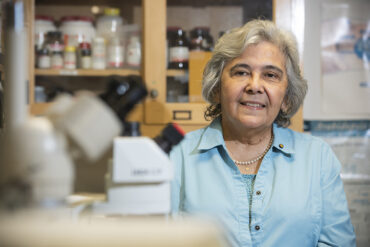
California State University, Northridge has been awarded nearly $2.3 million from the National Institutes of Health (NIH) to help graduate students transition from a master’s degree program to a doctoral program, and hopefully into a career in the biomedical research workforce.
The five-year grant is from the Bridges to the Doctorate Training Program in the NIH’s National Institute for General Medical Sciences. Targeting students from traditionally underrepresented communities, the grant includes money to cover about 60 percent of the students’ tuition to CSUN, as well as a $25,000 stipend and additional monies to support their research and attendance at professional conferences.
“This money can really make a difference for many of our students, who are often the first ones in their families to go to college,” said biology professor MariaElena Zavala, director of the Bridges to the Doctorate Training Program at CSUN. “But equally important, we will be partnering with five institutions. Faculty from those institutions will regularly meet with our Bridges students, providing them with support and mentorship, as well as serving as role models — showing them that they do have a place at some of the top Ph.D. programs in the country.”
The CSUN Bridges program partners with Stanford University; University of California, Berkeley; University of California, Davis; University of California, Riverside; and University of California, Santa Barbara.
The National Institute for General Medical Sciences supports programs that foster research training and the development of a strong and diverse biomedical research workforce through a variety of programs at the undergraduate, graduate, postdoctoral and faculty levels.
Only 11 institutions of higher learning across the United States were awarded a Bridges to the Doctorate Training Program grant last fall. In addition to CSUN, the other institutions include San Francisco State University, Cal State Los Angeles and Fresno State in California; Kennesaw State University in Georgia; Towson University in Maryland; University of Rochester in New York; North Carolina Agricultural and Technical State University in North Carolina; Case Western Reserve University in Ohio; Fisk University in Tennessee; and University of Texas Health Science Center in San Antonio, Texas.
Joining Zavala, who was recently tapped to give the prestigious mentoring keynote address at the annual international conference of the American Society for Cell Biology and the European Molecular Biology Organization, in administering the grant at CSUN are biology professors Cheryl Courtney-Hogue and Ray Hong.
Zavala said the Bridges program at CSUN is open to students getting master’s degrees in biology, chemistry, physics, psychology, nutrition and public health. The first cohort of six students started in the fall. Next year’s cohort will consist of 12 students, she said, adding that she and her colleagues hope to maintain a cohort of 12 students each year.
“What’s exciting is that we have money, through the grant, to support these students as they do their research, and we can use that money to send them to one of our partner institutions if, for some reason, CSUN does not have the resources for them to continue their work,” Zavala said.
Zavala said one of the goals of the program is to establish strong relationships with the partner institutions.
“While it would be nice if our students ended up getting their doctorates at those institutions, they don’t have to,” she said. “The point is that they can see that getting a doctorate is possible, and there are people out there who will support them in that effort.”




Comments are closed.